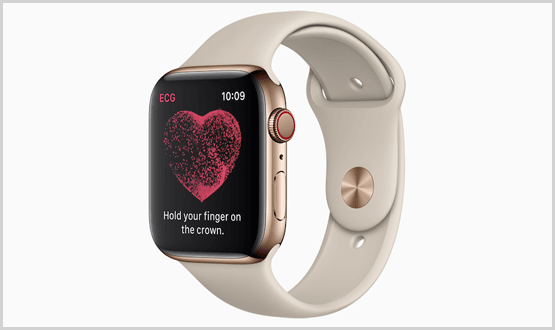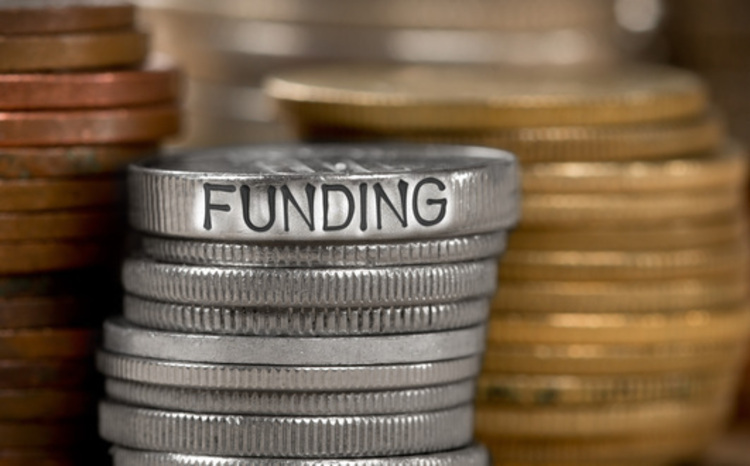With new ECG, Apple places heart health at core of latest watch launch

The latest Apple Watch will be able to perform an echocardiogram to measure a wearer’s heart rhythm and alert to irregularities, leaders at the company have announced.
Describing the Series 4 Apple Watch as “the ultimate guardian for your health”, chief operating officer Jeff Williams revealed the device has a new electronic heart sensor built in.
“Now you can taken an ECG anywhere, any time right from your wrist,” Williams explained at a keynote event yesterday (13 September).
He claimed the process takes less than 30 seconds and that, once complete, the user immediately receives a report detailing whether their heart rhythm is regular or irregular.
Williams also announced that the latest device will be able to detect falls – something he attributed to an improved accelerometer and gyroscope.
The chief operating officer said “a tremendous amount of data and analysis” had been required to identify the motions representative of someone having fallen over.
After detecting a fall, the watch will deliver an alert from which the user can initiate an emergency call. “However, if the watch senses you are immobile for one minute, it will start the call automatically,” Williams explained.
“And it also sends a message with our locations to your emergency contacts using the SOS feature that is already built in.”
Shareable data
Wiliams said data from any ECG, meawhile, could be easily shared with doctors – it will be stored in Apple’s Health App as a PDF.
While he claimed the Watch constituted “the first ECG product offered over the counter directly to consumers”, other companies have worked on making it possible to take a mobile ECG reading.
Most notable, arguably, is AliveCor’s KardiaMobile – an add-on device which works on both Apple and Android phones, and which has been trialled across the UK as part of the National Innovator Accelerator programme.
The device is available directly to consumers as well as being provided through healthcare organisations.
The company also produces a band for Apple Watches which enables the device to take an ECG. This was approved by the US Food and Drug Administration (FDA) late last year.
Not yet in the UK
Williams reported that the Apple ECG functionality is also FDA approved, along with a separate new function which detects and alerts to low heart rate – news greeted by the applause and cheers which are now characteristic of the company’s product launches.
But there was a caveat that will be important to anyone in the UK. Williams said both the ECG and low heart rate features will be available “to US customers later this year,” then added: “We are working hard to bring them to customers around the world.”
An electrocardiogram is a common test used to check the rhythm and electrical activity of the heart. It can be used to detect a range of problems including arrhythmias, when the heart’s rhythm is fast, slow, or irregular.
Heart rhythm problems can put individuals at increased risk of conditions including stroke.
ECGs are typically performed at a GP surgery or hospital.
Apple has long signalled interest in the health market, and recently joined other technology giants in committing to the promotion of open standards in the US healthcare market.
But the latest announcements were greeted with reservation by some. Cardiologist and digital medicine researcher Eric Topol – who is currently leading a review on how to support the UK health and care workforce deliver a digital future – told National Public Radio in the US that he was concerned the device could increase the number of false positives for arrhythmias.
And on Twitter he noted the focus on FDA approval with wry amusement. “Interesting how #AppleEvent is making such a big deal about detection of atrial fibrillation when this has been possible by a @US_FDA approved #AI algorithm on AppleWatch Series 3 since November 2017,” he remarked.





10 Comments
Perfect work you have done, this web site is really cool with wonderful information.
Maybe we have missed the point… while we scratch our heads trying to think of the application for such innovations, it can sometimes be the case they simply discover their own use cases outside of our particular needs… in any event we should commend Apple on the continued innovation of ‘telling the time’ I truly think they’ve nailed that one!
Gaz
Sounds good will help people who want to manage their health to get to their doctors before condition gets worse (or maybe change lifestyle to avoid the doc).
Bertl you are right. I run a HealthTech company with 70 doctors. It is they who know what they need!
I don’t doubt that they know what they need. The direction of travel of the healthcare system suggests, however, that what I need, as an NHS patient, is regarded by all as a complete irrelevance, especially as it isn’t good for the health of tech businesses. What we have here is a clear conflict of interests that nobody will acknowledge because it is inconvenient, and not good for economic growth. Let’s all pretend that patients are the beneficiaries, and that solves everything. Except that it is not true.
An ECG, or electrocardiogram is not the same as an Echocardiogram, which uses an ultrasound scan. The sub heading of this article needs to be corrected. There is no way that any watch can perform an Echocardiogram.
As Bertl says, it’s an ELECTROCARDIOGRAM (ECG)
and in fact, just a rhythm strip at that
That’s marvelous. But what our Doctors actually want is our blood pressure
I suggest that it is your doctor who might want to know, and who you might want to know. I also suggest that Apple and Apple’s customers want to know, but is that something that you want, given that you have no knowledge of, and no control whatever over what they do with your information? Watches will not be the only thing they will be selling.
This is incorrect Bertl. Apple does not see any health information and they are explicit about this. The user has control of their health data via the health app and is encrypted in the Secure Enclave or encrypted iCloud backup.
See https://www.apple.com/ios/health/ and https://www.apple.com/privacy/.
Comments are closed.